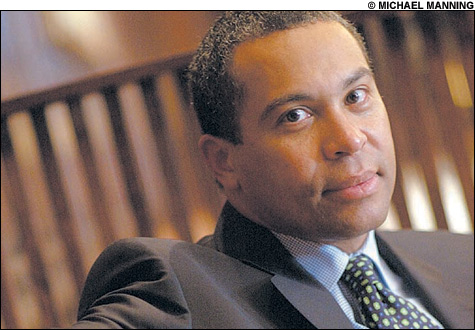
HOUSE ADVANTAGE: As Governor Deval Patrick stays mum on the gambling issue, speculation is running high as to his position. |
Friendly extortion
One path that Patrick probably won’t follow is Mitt Romney’s 2003 plan to ask casinos in nearby states to pay Massachusetts $75 million apiece in exchange for a promise not to build in the Bay State. |
With the Mashpee Wampanoag tribe quickly moving forward on its plans for a Cape Cod destination resort-casino in Middleborough, and other developers asking to be dealt in on the action, how long can Beacon Hill’s political power players continue to hold their cards so close to the vest?House Speaker Sal DiMasi, a stalwart opponent of casinos in the past, was said to be warming to the idea in a recent State House News Service report — but, in Joan Venocchi’s column in this past Sunday’s Boston Globe, said he was apparently against it.
Senate President Therese Murray, previously said to be anti-casino, has sung a different tune in recent weeks — but has also said that, due to her long relationship with the Mashpee Wampanoag tribe, she will recuse herself from the issue.
Trying to guess pols’ positions has been like trying to guess where a roulette ball will land. Still, even more of a crapshoot has been trying to pin down the opinion of Governor Deval Patrick. And the longer he keeps his thoughts private, the more weight observers are placing on his ultimate decision.
Patrick is now promising to announce his position by Labor Day. He is currently on vacation, studying policy briefings à la Michael Dukakis, before choosing a course of action for the state.
“Anyone who tells you that they know what the governor is going to do doesn’t know this governor,” says Michael Goldman, a political consultant who advises Patrick as part of a kitchen cabinet of veteran pols.
Those advisers are hardly of a single mind on gaming. Scott Harshbarger, another member of the group, adamantly opposes casinos, predicting that they will bring corruption, personal bankruptcies, and other ill effects. Goldman, too, has long opposed casinos, primarily because they raise state revenue unfairly, but says he now wonders whether that’s a sufficient reason to deny people what a clear majority of them want. Others are more enthusiastic about the idea.
But Patrick is secluding himself from their opinions. He didn’t even ask for them in the report by his small ad-hoc task force on the casino issue — delivered to him in late July and which he has infamously declined to release publicly. That report, says one person on the governor’s team who has seen it, is no more than a compilation of studies and findings on the benefits and costs of gaming. It contains no recommendation, no executive summary — not so much as a cover sheet, this insider says.
If Patrick’s leaning in any direction, or listening to anyone in particular, nobody seems to know which way or who that might be.
Filling the void
With the state’s top voices so silent on the issue, others have gained headlines for their takes — such as Boston mayor Thomas Menino, who wants to see a gaming palace at Suffolk Downs in East Boston.
Observers have paid close attention to State Treasurer Tim Cahill’s recent comments. Cahill has called for the state to make up to three commercial gaming licenses available, and to open them to a competitive bid — and not even the Mashpee would be guaranteed to get one, potentially leaving the tribe slotless.
Some are reading Cahill’s comments as trial balloons lofted by Patrick. Cahill has long been closer to Patrick than most in state government — a source in the treasurer’s office says they worked with the administration on a daily basis in developing Patrick’s recent bond proposals. Patrick’s chief of staff, Doug Rubin, used to be deputy treasurer under Cahill. And Patrick’s director of government affairs, Mike Morris, formerly held the same job for Cahill.
But in this case, insist both the treasury source and a source close to Patrick, Cahill does not have the governor’s ear — much to Cahill’s chagrin.
Others trying to sway Patrick are likewise unsure whether he’s listening. Patrick has designated Secretary of Economic Development Dan O’Connell as his point person on gaming, and O’Connell isn’t saying much on the subject. He is taking meetings — but will an August 27 confab with O’Connell really provide 15 municipalities near Middleborough serious input into Patrick’s September 3 decision?
“The secretary will continue to meet with interested parties on the gaming issue,” says O’Connell’s spokesperson, Kofi Jones. “The governor takes seriously any input he gets from any stakeholders on this issue.”
Not wishing to wait, stakeholders are trying to get their word out through the press. Advocates have released studies of the economic benefits; opponents have touted studies of the costs. Legal opinions have been bandied about.